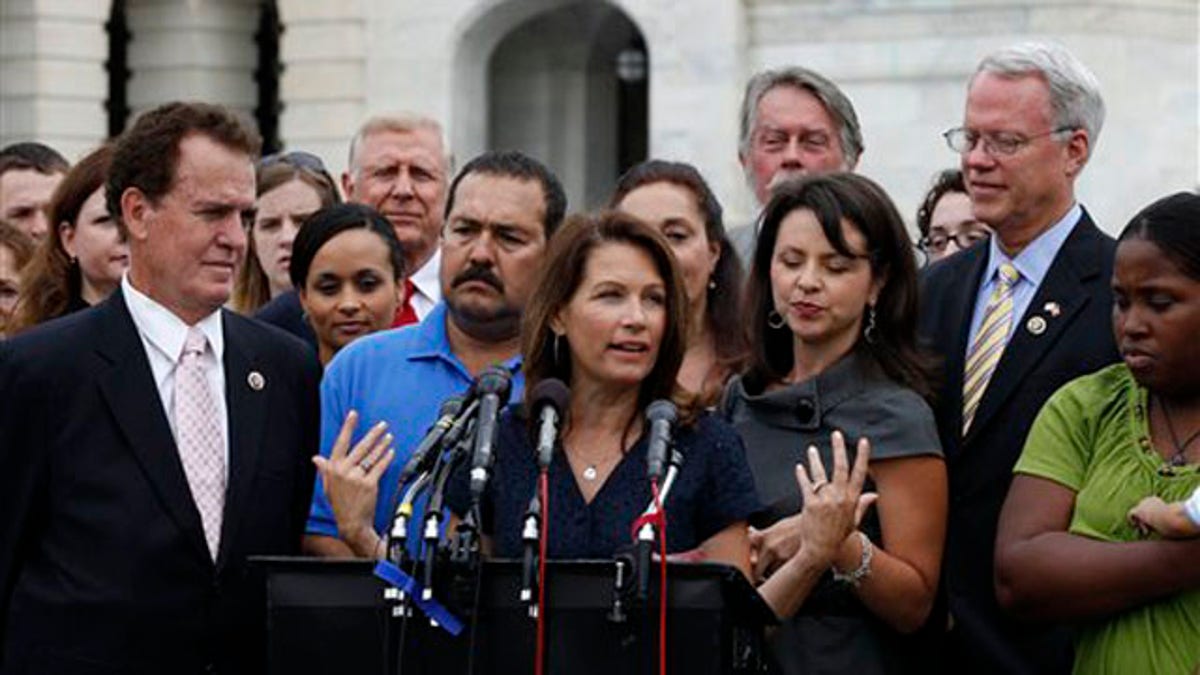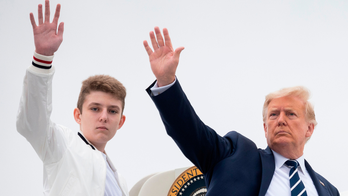
Rep. Michele Bachmann, center, speaks at a press conference for the Tea Party Caucus July 21 in Washington, D.C. (AP Photo)
A move by members of Congress to plant the Tea Party flag on Capitol Hill is getting a cautious reception from Tea Party members who are warning the lawmakers not to attempt a takeover of the grassroots movement.
The formation of an official Tea Party Caucus comes at a critical time in the movement's quest for identity and influence, with midterm elections on the horizon. The existence of a caucus in Washington potentially puts pressure on Tea Partiers to better define themselves before somebody else does it for them.
The caucus debuted Wednesday and already counts nearly 30 House Republicans as members. They did not claim to speak for the Tea Party movement, and Tea Partiers say that's the way it ought to stay.
"They're not the leaders of the movement. ... They don't give orders of any kind," said Shelby Blakely, a leadership council member for Tea Party Patriots and the director of the network's online publication. She said Tea Party Patriots is fine with the caucus, provided its only job is to listen. She described it as just another Tea Party, nothing more.
"We went from 2,350 groups to 2,351 groups nationwide," Blakely told FoxNews.com.
But the Tea Party has traditionally picked which candidates and lawmakers it supports, not vice-versa. Blakely said the motives and loyalties of incoming caucus members is "something worth watching for."
"If their voting records are not taken into account, then it's just a show," she said.
Rep. Michele Bachmann, R-Minn., who championed the caucus by asking House Speaker Nancy Pelosi last week to allow it, said she's not trying to hijack the movement.
"We decided to form a Tea Party caucus for one very important purpose -- to listen to the concerns of the Tea Party," Bachmann said Wednesday. "We are not the mouthpiece of the Tea Party. We are not taking the Tea Party and controlling it from Washington, D.C. I am not the head of the Tea Party, nor are any of these members of Congress the head of the Tea Party movement. The people are the head of the Tea Party movement in all of their form."
As of Wednesday morning, 29 House members, all Republicans, had joined the caucus, including Mike Pence of Indiana, Pete Hoekstra of Michigan, Paul Broun of Georgia, Todd Tiahrt of Kansas, John Carter of Texas and Cliff Stearns of Florida.
The lawmakers said they are not part of the Tea Party movement, but they do support its broad principles: lower taxes, reduced spending and smaller government.
Other groups are not yet sure what to make of the caucus.
"Who's to say what it will or won't be. Many are looking at it hopefully, but also warily," said Christina Botteri, with the National Tea Party Federation. She said she hopes the caucus will "stay true to the principles of the Tea Party."
The caucus would appear to offer an upside and a downside -- it could empower the movement with a direct line to legislators, but it could also take the reins of the movement by default.
The Tea Party as a whole has over the past year grown to include millions of Americans, but has coalesced under several sprawling umbrella groups -- not all of which play nice with each other or among themselves.
The latest outbreak came over the weekend, when the federation ousted from its ranks the Tea Party Express for not cutting ties with a prominent activist who wrote a racially charged blog about the NAACP. In response, activist Mark Williams and the Tea Party Express ridiculed the federation -- an umbrella group started just a few months ago -- saying it has no right to decide who's in and who's out of the Tea Party.
This kind of mindset makes the Tea Party Caucus a bit of an unknown quantity.
Blakely said she's not concerned about anybody trying to define the movement, expressing confidence about her group's ability to bring in millions of supporters with a clearly defined set of principles without dictating to the local chapters.
"It's nothing new. People have been attempting to define the Tea Parties as something that suits their group since the Tea Party started," she said.
But a key focus of the national Tea Party convention, held February in Nashville, was to help the thousands of local groups better organize, even centralize. The convention, brought together by the Tea Party Nation, sought to establish a semi-official Tea Party platform and urge local groups to get directly involved in elections by endorsing candidates.
The Tea Party Nation had a mostly positive reaction to the formation of the caucus on Capitol Hill. The group's official statement said it was "thrilled" that Bachmann formed the group.
"This is the sign of a true and profound change that is coming to this country," the group said.
Founder Judson Phillips told Fox News that he's not concerned at the moment about the caucus growing out of control.
"Ronald Reagan once said the closest thing to eternal life on this planet is a government program," he said. "I hope those who have Tea Party sympathies keep this from becoming another government bureaucracy."




